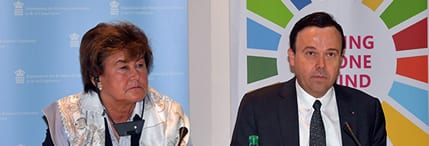Gilles Tonelli, Minister of Foreign Affairs and Cooperation and Stéphane Valeri, Minister of Health and Social Affairs, on Tuesday opened the third High Level Meeting of the Initiative of Small WHO European States in the presence of Dr Zsuzsanna Jakab, WHO Regional Director for Europe.
The initiative was established by the WHO so that the Member States of the European region with fewer than one million inhabitants can conduct a regular exchange on common issues and share experience in order to improve the life of their populations, in line with the WHO program “Health 2020”.
The meeting at the Novotel Monte-Carlo focused on the theme “Health and Sustainable Development: the advantages of small countries” with delegations led by the Health Ministers of eight small European states, all members of the World Health Organisation. Together they released the Monaco statement, which outlines health goals and a call for climate action within the Sustainable Development Programme for 2030.
“We are small countries,” Monaco’s Health Minister stated during a press conference, “but our impact is huge, reaching far beyond our borders.”
The Minister later told Monaco Life that this gathering is important for sharing ideas about health issues, and that the eight countries have many common points. “It’s important to treat statistics more selectively for small countries. For example, in Monaco, if one year you have no reported cases of infectious disease but the following year one person is infected, you have an increase of 100%. This can not be taken seriously.”
Mr Valeri also cited the importance of discussing preventative health care measures that have proven successful in one country with the others. “We launched a breast cancer awareness campaign, a free test for women from the ages of 50 to 80 and have been able to detect 200 cases, with half of the women having never been screened. We know that if we catch the cancer early enough, in 90% of cases the disease can be cured. So launching more active prevention policies is something we’ve emphasised to other countries, explaining how they could do the same thing.”
During the press conference, Dr Jakab announced that she had just personally given the Scientific Centre of Monaco a letter of collaboration for their internationally recognised work. Speaking to Monaco Life about the partnership, she said: “The scientific institute is doing an outstanding job in the field of climate change and is doing something extraordinary by bringing together three main streams: polar health, marine health and human health, and detecting whether climate change been impacted.”
The Regional Director added, “WHO is very serious about whether a centre is appointed as a WHO-collaborated centre and it takes four years of joint work before a decision is made.”
The eight small countries include Andorra, Cyprus, Iceland, Luxembourg, Malta, Monaco, Montenegro and San Marino.
The 4th meeting of the High Level Initiative will be held in Malta from June 24 to 27, 2017.
Small WHO European States have huge impact

